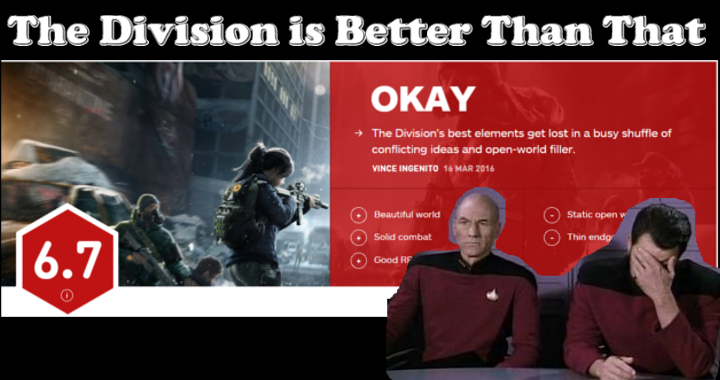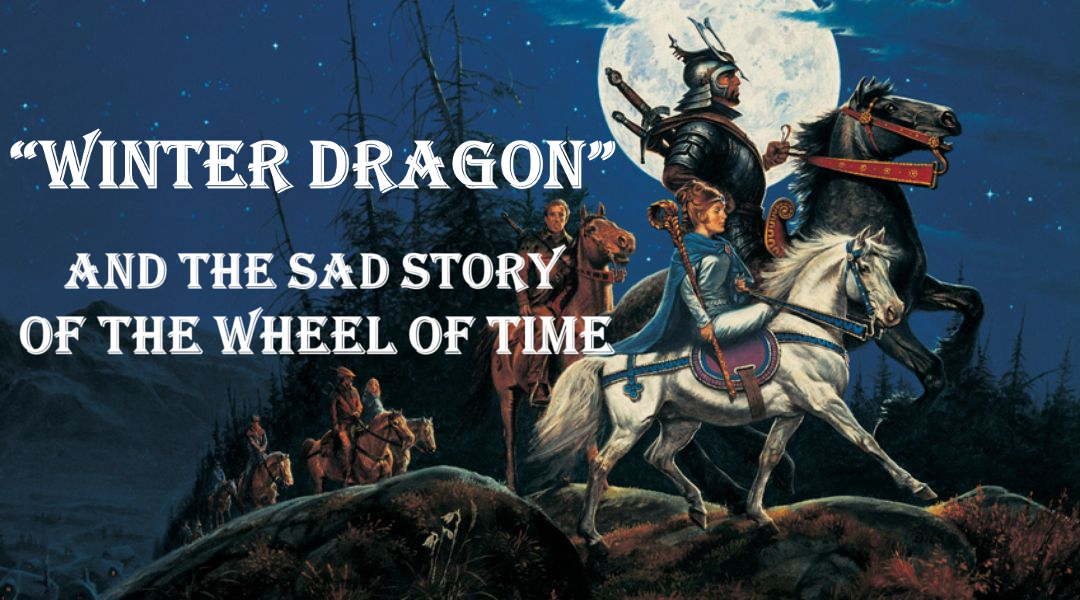
No, IGN, The Division is Better than a 6.7
Ubisoft’s The Division launched this month and is consuming most gaming headlines as we march reluctantly towards VR later in March. The touted open world MMO shooter has been in gestation entirely way too long (something we harped on only a few months ago), but in execution we’re finding the game actually is a blast to play and is an early candidate for us for coop game of the year. Sure, it misses the mark on story telling or a visceral combat experience we’re accustomed to after years of Destiny gun worship (we’ll never forget you, Bad Mojo). But it’s a brand new IP that attempts to do a heck of a lot out of the gate and is proving to be a surprisingly fun diversion for gamers in the Destiny slump now.

A world of bullet sponges is still fun to explore in coop.
So we were stunned to see IGN’s 6.7 score for the game citing problems from an “unengaging” open world, a thin end game, or even how “[y]ears of virtual experience” has taught the reviewer that a Saiga-12 shotgun should kill someone faster than it does in The Division. Now we’re not going to pick apart the various criticisms IGN levied at the game as we tend to agree with most of the concerns. The game doesn’t offer much in the end game (yet) but that will take you 30 plus hours to reach that. The gunplay isn’t as satisfying as other shooters.
After all, not every game can be as good as Def Jam: Icon which IGN gave a 7 for its intense “no-holds barred street fight but with style and rhythm.”

Perhaps if developer Massive had focused on flame effects instead of delivering a always-on MMO, they would have gotten a 7
This isn’t just a matter of opinions though as reviews matter. Sure, there can be a correlation between review scores and games sales but there’s a much more direct correlation between reviews and the livelihood of developers. Kotaku had a fantastic write up last year about how metacritic scores hurt developers citing a story in which the developers of Fallout: New Vegas would have each received a $14k bonus if the game had an overall score of 85 on Metacritic – it received an 84. Review scores are used as leverage against developers affecting their ability to strike deals with publishers if they have too many poorly scored games in their past. One striking story in the Kotaku article even talks about a develop hiring a particular reviewer known for giving “fickle” scores to games to review his game only to throw it away just to ensure that reviewer doesn’t actually weigh in on that title.
Reviews clearly can hurt developers, especially for a game like The Division which clearly isn’t as good as Kinectimals which garnered a 7 for its “so freaking cute!” animal design.

Or perhaps The Division needed more of whatever nightmare fuel this is to get a better score
Don’t get us wrong, we’re in favor of a feedback loop to judge quality games and promote talented developers, but to lean so heavily on the subjective measure of a game review can be problematic. For instance, two of the biggest gaming sites, IGN and Gamespot, both gave last year’s Alien Isolation failing grades at 59 and 60 respectively. On Metacritic, they are among the 3 lowest scores that game and 20 points below the average score of the game. Again, it’s an opinion (one in which we clearly didn’t share), but it’s wildly off from the median score. Same with recent wildly hyped The Witness which scored a perfect 10 from IGN which is significantly above the median score it has on Metacritic. Under the gun to produce copy in time for a publisher’s deadline, we could see how a long-winded puzzle game with so much buzz could perhaps get blessed with such a score. However now that we’ve had the time to explore the edges of that world to see what it means and come up empty, we wonder if IGN would score it the same. Looking at Google Trends for the last 90 days, it looks as though most gamers would agree that The Witness isn’t worth much attention when compared to The Division or even a two year old game like Destiny.
But, not every game can be as good Prototype 2 which IGN gave a 7.

“Fun but forgettable.” – IGN
Reviews will inherently be subjective and therefore apparently erratic which is unfortunate considering how much it can impact a developer. Kotaku picked up on this issue a while ago and has since migrated to a review format that avoids a number to avoid unduly penalizing a game – a format we have adopted as well. It would be tremendous to see a site as big and influential as IGN consider this option as well. The Division has its flaws to be sure, but as an original IP and a welcome addition for cooperative gaming, we hate to see the wind get knocked of it by a failing grade.
But, we supposed, after all it’s not as good as I Am Bread which scored a 7.2 despite its “myriad [of] glitches” for being “good.”

“[T]here’s a certain thrill in discovering that – for example – rubbing up against butter and jam improves your deliciousness score.” IGN


